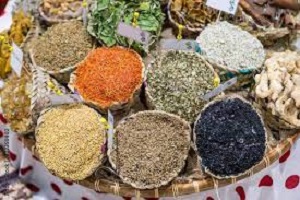Herbs, Food Spices & Seasoning in Nigeria Kitchen
Herbs, Food Spices & Seasoning in Nigeria Kitchen. Please Watch >>>
My research has revealed that there are far more traditional herbs, spices, and condiments than we are aware of or use.
If our forefathers (or is it foremothers?) could cook fabulous, tasty, delicious, and nutritious meals with them back then, I see no reason why we can’t now!
Condiments not only add flavor, taste, and beauty to our Nigerian dishes, but they also have numerous health benefits (this aspect many do not know).
There are innumerable herbs and spices available;
Pepper, thyme, rosemary, oregano, basil, parsley, curry powder, bay leaf, turmeric, nutmeg, ginger, garlic chives, and a variety of other herbs and spices.
Nigerian herbs are mostly leafy, while spices are derived from other parts of the plant, such as roots, stems, and flowers.
I believe the difficulty is in learning what the spices and herbs are, where to buy them, and how to use them effectively in our Nigeria Kitchen.
This video covers all that and more. Enjoy!

Health Benefits of Herbs and Spices
There is now ample evidence that spices and herbs have antioxidant, anti-inflammatory, antitumorigenic, anticarcinogenic, glucose- and cholesterol-lowering properties as well as properties that affect cognition and mood
Herbs and Spices List ~ Top 50 spice Types
- Cilantro/coriander
- Artichoke
- Rosemary
- Bay leaves
- Mint leaves
- Basil
- Clove
- Olive
- Shallot
- Turmeric
- Garlic
- Ginger
- Onion
- Spring onions/green onions
- Lemongrass
- Chives
- Green chili
Herbs and Spice Names ~ English Names of Your Favourite Local Spices
- Cloves (English)
– Dadoa Amba (Twi)
– P3pr3 (Twi)
– Mbr3go Amba (Fante) - Anise seed (English)
– nkitinkiti (Twi)
– Osu kon (Ga) - Basil (English)
– Akuko Besa (Twi) - Grains of Selim /Negro Pepper (English)
– Hwentia (Twi)
– Soh (Ga) - Black Peppercorns / West African Black Pepper/Tailed Pepper (English)
– Esoro Wisa (Twi)
– Wire Din (Ga) - Chilli/ African Bird pepper
– Akweley Waabi (Ga)
– Misewa (Twi) - Grains of Paradise /Alligator Pepper / Guinea Pepper (English)
– Efom Wisa (Twi)
– Wire Tsuru (Ga) - Calabash Nutmeg / African Nutmeg (English)
– Wedie Aba (Twi)
– Awerewa (Twi) - Turkey Berry (English)
– Abeduru (Twi)
– Kwahu Nsosua (Twi) - African Locust Bean
– Dawadawa (Twi)
English and Botanical Names of the following List of Indigenous Spices
- Local Names: Mpuru uziza (Igbo), (Ashanti pepper) (ghana), Benin pepper, false cubeb
English Name: West African pepper
Botanical Name: Piper guineese
- Local Name: Kanafuru (Hausa)
English Name: Cloves
Botanical Name: Syzygium aromaticum
- Local Names: “Ehu”/ “Ehuru”(Igbo) , “Ariwo”(Yoruba) , “Iwo” “Erhe (itshekiri)”)
English Name: Calabash Nutmeg
Botanical Name: Monodora myristica
- Local Name: “Umilo” itshekiri)
English Name: Nutmeg
Botanical Name: Myristica fragrans
- Local Name:
English Name: Ginger
Botanical Name: Zingiber officinale
- Local Name:
English Name: Garlic
Botanical Name: Allium sativum
- Local Name: Gbafilo
English Name:
Botanical Name: Uapaca guineesis
- Local Name: Ataiko
English Name:
Botanical Name:
- Local Name: Irugege
English Name:
Botanical Name:
- Local Name: Oburunbebe Stick
English Name: Liquorice ( British English ) or licorice ( American English )
Botanical Name: Glycyrrhiza glabra
- Local Name:
English Name: Tumeric
Botanical Name:
- Local Name:
Nigerian Spices, Herbs, & Seasoning Popular in My Nigerian Kitchen
- Salt/sodium chloride
Salt is the only condiment that provides our food flavor. I season everything I make with salt, but only a pinch. My family did not consume a lot of salt when I was growing up.
I’ve become used to not eating a lot of salt to the point where I can eat dinner without any salt at all.
I rarely add salt to Egusi Soup because egusi takes on a salty flavor when cooked. And, by the time you add salty stockfish, crayfish, and stock cubes, the Egusi Soup may already be salty enough for me and my family. When making Egusi Soup, keep in mind that it is quite easy for it to become salty.
- Thyme
Thyme is an intriguing spice with a wide range of uses. This spice provides several health advantages. Thyme, for example, has been shown to protect the heart and enhance blood circulation.
It has also been connected to the treatment of respiratory disorders like bronchitis and seasonal allergies. Thyme, on the other hand, may induce stomach discomfort if you have a sensitive stomach.
It can also be used in a variety of ways. You can use it to season meat or make Jollof or fried rice with it.
- Curry leaves
Curry leaves are frequently used in the preparation of fried or jollof rice to give the cuisine a distinct flavor. Calcium, phosphorus, iron and vitamins A, B, C, and E are all found in the leaves.
Curry leaves have several health benefits, including:
- Reducing blood cholesterol
- Lowering blood sugar in diabetics
Curry leaves have several health benefits, including:
- Black pepper
Black pepper is another spice that is noted for imparting a distinct flavor to meals. It’s commonly used to give pepper soup a classic spicy flavor.
Black pepper’s origins can be traced back to South India. However, the pepper has been grown in tropical nations such as Nigeria, where it has thrived.



Pingback: Food Help for Pennis Growth ~ Pennies Enlarge Foods - 9jafoods